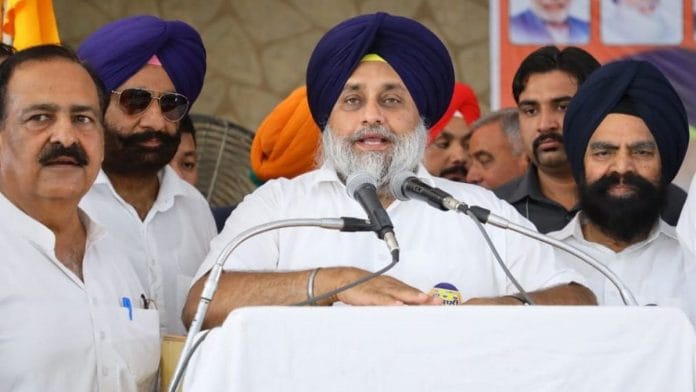Chandigarh: Shiromani Akali Dal president and former Punjab deputy chief minister Sukhbir Singh Badal said a case-by-case approach should be adopted while granting Indian citizenship to anyone, with persecution and not religion as the grounds for consideration.
Amid nationwide protests against the Citizenship (Amendment) Act, the SAD, a close ally of the ruling BJP, has come out openly against the exclusion of Muslims from the law.
“Even if a community is only .0001 per cent in size, it should not be made to feel that it is not a part of India,” Sukhbir told ThePrint. “A prime minister or chief minister is not the prime minister or chief minister of just one community, but of the entire state or country.”
Sukhbir also said the Modi government has raked up an “unnecessary controversy” by keeping Muslims out of the purview of the new law, when it could in fact shed its “anti-Muslim” tag by including the community.
“The inclusion of Muslims would have silenced all critics of the act. The NDA could have shed the tag of being anti-Muslim. Instead, what we have done is rake up an unnecessary controversy and we are now at the receiving end of flak from the opposition, which has got a convenient handle to beat us with,” Sukhbir said.
The MP from Punjab’s Jalalabad added, “In any case, there is going to be a committee which is going to look at all individual cases of persecution. When it is going to be on a case-to-case basis, why have religion as the criterion at all?”
Sukhbir said Muslims were being persecuted in many Muslim countries too, citing examples of Syria and Afghanistan.
“The exclusion of Muslims from the CAA was thus visibly wrong. Ahmediyas, for instance, are a group of Muslims settled in Qadian in Punjab, where they have their international headquarters. They are not considered to be Muslims at all in Pakistan and many other Muslim countries in the world,” he said.
The SAD had supported the Citizenship (Amendment) Bill when it was tabled in both the Lok Sabha and Rajya Sabha. However, in the Lok Sabha debate on 9 December, Sukhbir had said persecuted Muslims should be included in the proposed law.
The act promises citizenship to Hindus, Sikhs, Christians, Parsis, Buddhists and Jains who arrived in India on or before 31 December 2014 after suffering religious persecution in Pakistan, Afghanistan and Bangladesh.
Also read: With Jharkhand, India is telling Modi it wants a ‘majboor sarkaar’, not ‘majboot sarkaar’
Afghanistan was not part of original bill: Sukhbir
Sukhbir claimed credit for the inclusion of Afghanistan in the act, in addition to Pakistan and Bangladesh.
He said the original draft of the bill did not include Afghanistan. “It was at our insistence that Afghanistan was added to the bill. In fact, we have been fighting for such a bill for the past 30 years,” referring to the plight of Sikhs in Afghanistan.
“Because of the worsening situation in Afghanistan, thousands of Sikhs settled there had fled to India and taken refuge here. They need to be protected by the act because they do not have any documents. They give several examples of their family members who went and settled in USA or England, and were granted citizenship within a matter of months. In India, they had to wait indefinitely,” he said.
‘Cannot discriminate on the basis of religion’
Asserting that secularism is inherent in the Indian Constitution and also the Sikh religion, Sukhbir said anyone who faces persecution in his or her country should be granted Indian citizenship, religion notwithstanding.
“We must not forget that India is a secular country. Our nation is home to people of every religion and this act affects all the minority communities in India. Why don’t we include the Muslims in it? Why should we say ‘except Muslims’ or except this or that? We are a democracy, and our Constitution says that we should not and cannot discriminate on the basis of religion,” he said.
Also read: Modi wrongly quoted Mahatma Gandhi on Pakistan’s Hindu & Sikh refugees to defend CAA






